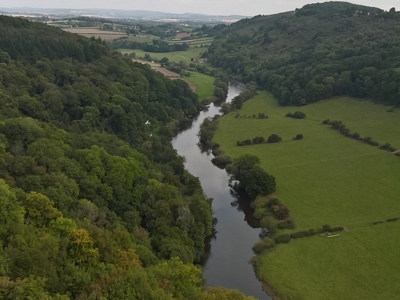
Farming practices will have to change, rules judge following River Action legal action over state of River Wye
A judge has ruled that farming practices will have to change so that farmers obey the Farming Rules for Water in response to a legal challenge by River Action over the Environment Agency’s alleged failure to enforce regulations to protect the River Wye from pollution.
Posted on 24 May 2024
In a judgment handed down today, a judge found that the Environment Agency (EA) had responded to River Action’s campaign for change and improved its enforcement of the Farming Rules for Water.
River Action says its legal action to make the Environment Agency face up to its responsibility to enforce regulations to save the River Wye from the effects of agricultural pollution was entirely justified and the EA would not have improved its approach to enforcement to convince the court that it was now complying with its responsibilities if it had not brought the legal action.
The judge was at pains to point out the important role the case has had in clarifying the legal obligations on farmers and the EA’s duties in enforcing them, finding:
“It is undoubtedly unfortunate, and has not assisted the defendant’s enforcement activities, that there has been a conflict in the interpretation of the 2018 Regulations between the defendant (the EA) and the interested party (DEFRA). However, a significant by-product of these proceedings is, firstly, that that difference of opinion has been bought into the public domain for determination, and, secondly, that the defendant’s internal documentation (including for instance the FAQ’s) have been revisited, revised and refined to ensure that they have at their foundation the defendant’s interpretation of the 2018 Regulations.
“No doubt the clarification of the correct interpretation of the 2018 Regulations comprised within this judgment will provide further assistance in future.”
The High Court examined the EA’s enforcement of regulations that govern the amount of organic manure and artificial fertiliser that can be spread on agricultural land from which water runs off and leaches into the River Wye.
It was argued that the Wye is heavily polluted because excessive amounts of animal and in particular chicken manure are regularly spread across land within the river catchment, leading to a substantial increase in levels of phosphorus in the soil. This then runs off and leaches into the river, causing widespread algal blooms along the length of the river system, turning the water an opaque green.
Algal blooms block sunlight, remove oxygen and cause widespread algal deposits across the riverbed, with severe consequences for the vegetation and wildlife of the river.
The Wye was designated a Special Area of Conservation (SAC) to protect the river’s once-famous extensive Ranunculus river weed beds. However over 90 per cent of the river’s Ranunculus have now been lost, smothered by algal blooms and last year Natural England downgraded the Wye’s environmental status to Unfavourable, declining.
River Action says this could have been seriously mitigated had the EA enforced existing environmental regulations. River Action had argued:
- The Environment Agency has adopted an approach to enforcing the Farming Rules for Water (FRfW) that ultimately frustrates the purpose of the legislation it is supposed to enforce
- By slavishly following guidance issued by the Environment Secretary the Environment Agency has put itself in a situation where it is acting unlawfully
- The Environment Agency has breached regulation 9(3) of The Conservation of Habitats and Species Regulations 2017 in that its policy on enforcement of the FRfW unlawfully fails to follow the requirements of the Habitats Directive
The judge dismissed the claim for judicial review on all three grounds, but he found that with the changes made to the EA’s enforcement practices during the course of the proceedings, the EA’s documents were compliant with the law. These changes were only made as a result of River Action’s legal claim.
Importantly, the National Farmers’ Union (NFU) put forward detailed evidence suggesting that it would not be viable to farm in a way that complied with River Action’s interpretation of the FRfW. Under very tight time constraints, and working with a range of farmers who practise sustainable and regenerative farming methods, River Action put forward compelling evidence that farmers could farm in a way that complies with the law.
The judge found that the farming practices described in the NFU’s evidence will need to change if they are to comply with the FRfW, saying:
“The claimant’s evidence demonstrates that there is practical experience of agricultural practices being capable of complying with the claimant and defendant’s interpretation of the regulations. The evidence provided by the intervener (the NFU) demonstrates that current agricultural working practices would have to change if the claimant’s and the defendant’s interpretation of the Regulations is to be complied with, and that changes to the way in which farms operate together with associated costs would arise from the operation of that interpretation. Whilst no doubt unwelcome to the intervener and its members, I am unable to accept that the evidence demonstrates the kind of impracticality or absurdity which justifies the rejection of the claimant’s and defendant’s case on this point. For the reasons I have set out above, is the appropriate interpretation of regulation 4 and its effect.”
River Action’s chairman and founder Charles Watson said:
“We clearly have a number of reasons to be pleased with today’s judgment: River Action was deemed to have done the right thing in bringing this case to court; River Action’s interpretation of the law was considered by the judge to be correct with the NFU’s intervention being squarely dismissed and, most significantly, the environmental damage perpetrated by intensive farming practices has been acknowledged and thanks to River Action bringing its claim, the Environment Agency has changed its approach to enforcing the Farming Rules for Water. While the judge states the latter point is grounds to justify rejecting River Action’s belief that the EA has acted unlawfully, we remain concerned that there is still widespread evidence that agricultural regulations are being broken across the Wye Catchment and that the EA is still not being held accountable for its failure to enforce the law. River Action is simply not prepared to sit back and continue to watch these injustices to our rivers continue. Accordingly, we are taking immediate advice with regards to appealing the judgment.”
River Action is represented by Leigh Day environment team solicitor Ricardo Gama, who added:
“River Action feel vindicated in having brought their claim for judicial review. They believe that the dire state of the River Wye is in part because of a failure properly to enforce the rules that were put in place specifically to deal with agricultural pollution, the main cause of the decline in the health of the river. The judge has found that the Environment Agency’s enforcement policies are now lawful, but he has also noted that significant improvements were made to the policies to address the issues which River Action’s case has brought to light.
“The judge was also unpersuaded by evidence put forward by the NFU that it would not be viable to farm in a legally compliant way if River Action’s interpretation of the law was right. The judge has said that River Action was right in their interpretation of the law and he welcomed the extensive evidence which River Action put forward of farmers who do the right thing and farm in a way that respects the rules.
“River Action hope that the important clarification to the law contained in this judgment will help regulators, farmers and communities understand their legal duties. However, they are concerned with aspects of the judgment and are considering an appeal.”

River Action wins permission for judicial review of Environment Agency enforcement of regulations to protect River Wye from pollution
River Action has been granted permission for judicial review of the Environment Agency’s alleged failure to protect the River Wye from pollution.

Multi-million-pound legal claim launched to compensate people living near River Wye for pollution allegedly caused by chicken producers
A legal claim potentially worth hundreds of millions of pounds has been launched by law firm Leigh Day in a bid to compensate thousands of people living in the Wye catchment likely to have been affected by a major degradation of the River Wye and its tributaries in recent years.


